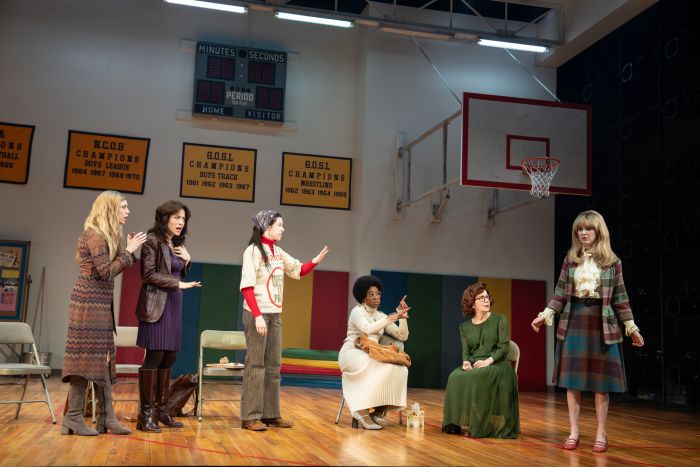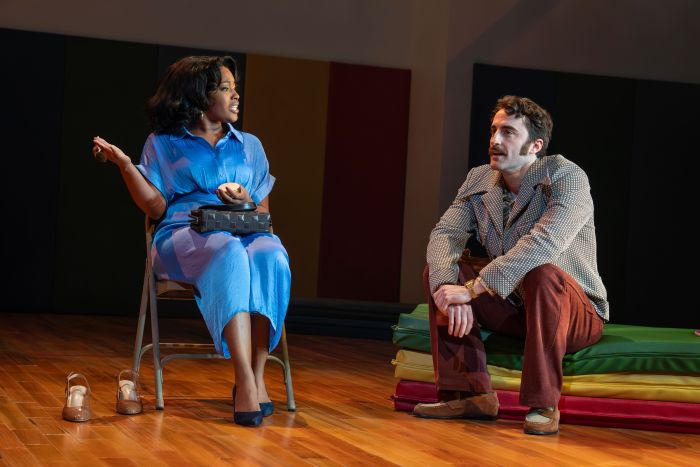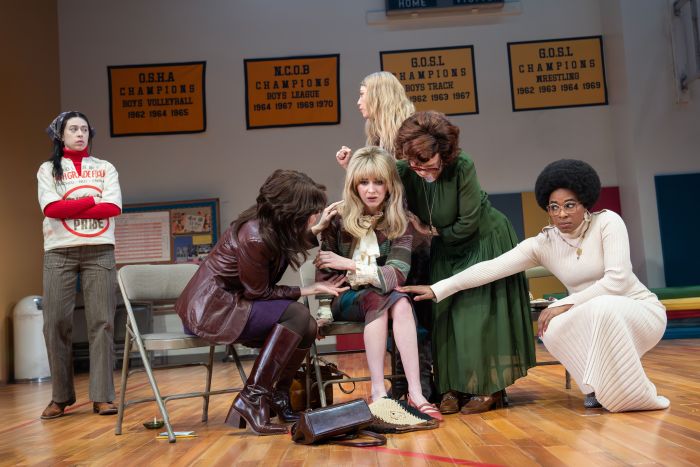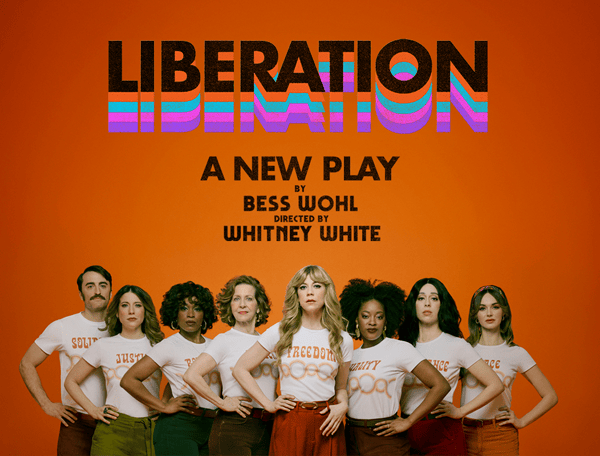Roundabout Theatre Company’s world-premiere of Liberation by playwright Bess Wohl addresses the efforts and failures of the Women’s Movement over the 50+ years since 1970, in a meta-theatrical go-back story told from the perspective of the daughter of the deceased Lizzie, who started a group meeting for women in the basement gym of a community center in Ohio, where six strangers gathered weekly in an attempt to advance feminism in their own lives and the world. Combining personal direct-address commentary with re-enacted segments, the play moves back and forth in time from the present to memories of the group, the issues they faced in the ’70s, which ones still persist, and what setbacks have resurfaced today.

A consistently excellent cast embodies the characters, each with a different motivation and each representative of a different type (sometimes leaning towards stereotypes in Wohl’s writing): the hippie drifter Susan (played by Adina Verson); the Black activist Celeste (Kristolyn Lloyd); the older married-with-children Margie (Betsy Aidem); the feisty Italian Isidora (Irene Sofia Lucio), who only married an American man to get her green card; the pretty, young, and hesitant Dora (Audrey Corsa), who initially shows up by accident, and uses her looks to get ahead at work. Under the direction and active blocking of Whitney White, they move around the stage and bring the laughs and the conflicts. But the pace of the long show becomes increasingly slow in Act 2, and the time frame is at times confusing, as are the figures of Lizzie and her daughter, both portrayed by the outstanding lead Susannah Flood, who develops an instant rapport with the audience, repeatedly breaking the fourth wall and commenting on our current situation, as well as delivering the telling points of her late mother’s narrative by contacting the others and hearing their versions.
Joining the featured cast are Charlie Thurston as Bill, who comes to the gym for some basketball practice and has a pivotal role in Lizzie’s future, and Kayla Davion as Joanne, who comes to pick up the backpack left there by one of her kids, complains that she wasn’t given a bigger role in the show, and then takes on a lead segment, while perfectly capturing the full range of emotions, from annoyed to funny to revealingly poignant.

Despite the fine acting, there are plot points and personality traits that, beyond being, as advertised, a “provocative, revealing, and irreverent” deep dive into “the dynamics of women’s private meetings and what really goes on when women meet behind closed doors,” come across as the same old sexist tropes that the characters are ostensibly trying to overthrow. They lie and keep secrets about their relationships and situations, engage in heated arguments with each other and thereby demonstrate the old commonplace that women just can’t get along, and outside of the room, choose to do exactly what they are fighting against in the consciousness-raising meetings, leaving me to question if this isn’t an egregious case of women-blaming for the lack of progress in our society. And there’s the visual metaphor of the six women in the group baring their souls by baring their bodies and sharing what they don’t and do like about them, for an extended opening scene in the second act – nothing new or revolutionary there, for women who’ve always been objects of the gaze and expected to get naked to get ahead (notably to attract an audience on the stage and screen).
Before you go, please note that, because of the full nudity, the event is “phone-free” with everyone in the house required to have their cell phone turned off and locked in a Yondr pouch (which you keep with you at all times, and have unlocked upon exiting the theater, lengthening the already long show), in order to, as they explain, “protect the privacy of our performers” (who appear naked eight times a week in front of hundreds of theatergoers – but get paid for it, which they wouldn’t for cell phone photos). For me, it comes across as gratuitous (we can discuss our bodies while remaining clothed), designed more to spark attention, controversy, and ticket sales than to advance the feminist cause. Others may see it as a liberating move for the women to reclaim their bodies, of all different sizes, shapes, and ages, without shame. As with the other matters raised, there are no universal answers or resolutions.

The artistic design provides effective support for the cast, with a stationary set by David Zinn that has the realistic look of a basement gym, with folding chairs the actors set up for their meetings; costumes by Qween Jean, with hair and wigs by Nikiya Mathis, that define the personalities and the decades; and sound by Palmer Hefferan and lighting by Cha See that shift with the transitions of scenes and times. Vocal and dialect coaching by Gigi Buffington provides distinctive accents and speech patterns for the characters, and Kelsey Rainwater serves as the intimacy coordinator for the revealing segments of close contact.
While Liberation conveys many ideas and implications of what went wrong in the fight for the equality of women, we are left with no satisfying answers. My hope is that it does at least inspire the determination not to give up – especially now.
Running Time: Approximately two hours and 20 minutes, including an intermission.

Liberation plays through Sunday, March 30, 2025, at Roundabout Theatre Company, performing at the Harold and Miriam Steinberg Center for Theatre, the Laura Pels Theatre, 111 West 46th Street, NYC. For tickets (priced at $81-164, including fees), go online.



